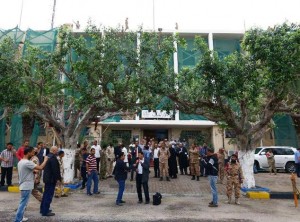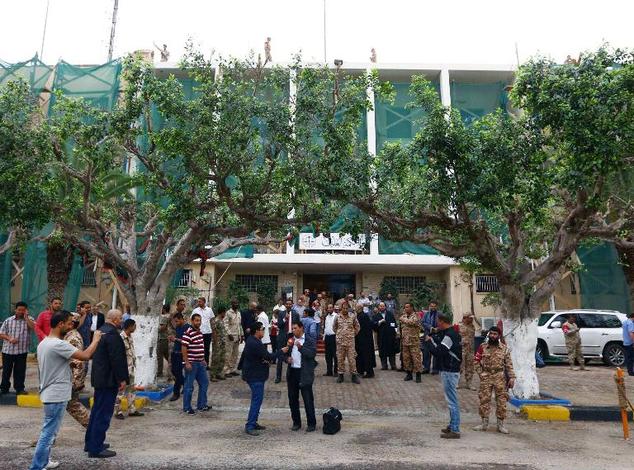By Mohamed Eljarh.

Libya’s Supreme Court has declared the country’s internationally-recognised and democratically-elected House of Representatives illegal and unconstitutional.
Boycotting Islamist and Misratan . . .[restrict]members of the House of Representative and Islamist members of the former legislature (the General National Congress, or GNC), lodged the legal challenge against the new legislature back in August. The House of Representatives, which is currently sitting in Tobruk, called for an emergency session to consider the Supreme Court’s decision, and announced that it rejects the court’s ruling.
Many House representatives and observers I spoke to seemed confused about the ruling. “We thought the [court case] was about the place where the parliament was sitting and not the elections that brought it into power,” said Farag Bo Hashim, the House’s spokesperson. Indeed, the initial legal challenge was lodged on the basis that the parliament should be sitting in Benghazi and not Tobruk. But the court ruled that the electoral process and the constitutional amendment that made those elections possible did not follow the proper protocol.
The Supreme Court failed to explain the reasoning behind its ruling, raising concerns about the conditions in which the judges have been operating. The court issued its ruling from its constitutional chamber in Tripoli, which is currently under the control of Islamist and Misratan militias that oppose the House of Representatives. On top of this, the electoral law that the House is said to have breached was put in place by the GNC, which was dominated by Islamist and pro-militia blocs. Many House of Representatives members have therefore told me that they will reject the Supreme Court’s ruling. They claim it made its decision under gunpoint, as militants threatened the judges and their families. The House of Representatives’ official statement upholds this argument, saying that the groups controlling Tripoli forced the Supreme Court into overstepping its mandate and authority. (The photo above shows Libyan lawyers celebrating the decision outside the Tripoli courthouse on Nov. 6.)
The legal challenge, which began eight weeks ago, will likely determine where Libya goes from here. The decision leaves Libya without an officially recognised government, widening the chasm between the Islamist dominated factions and the tribal and nationalist factions that have been embroiled in conflict for months.
The Supreme Court’s ruling, if accepted, would force the House of Representatives to dissolve, leaving the previous parliament, the unpopular and discredited General National Congress, to resume its activities as the only valid, democratically-elected legislature in the country. Yet many in the dissolved House of Representatives are already refusing to recognize the authority of the GNC, and the armed factions supporting the House of Representatives will likely do the same. This includes the army units working to secure eastern Libya; the forces loyal to General Khalifa Hafter that are fighting Islamist militias in Benghazi; and the federalists and Zintani militiamen supporting the House’s government.
Following the ruling, Benghazi’s federalist representative, Benghazi Abu Baker Buera, told Radio France International that Cyrenaica (Libya’s eastern province) should seek independence and establish its own institutions. This represents a setback to Libya’s unity.
The federalists had previously agreed to participate in the House of Representative’s elections and to pursue their agenda forward through the democratically elected institution. But this withdrawal is exactly the kind of reaction we can now expect.
As GNC member for Tobruk Othman Idris said over the phone, “The court’s decision is the real start of Libya’s partition.”
Meanwhile, the GNC has announced that it accepts the ruling and will resume its legislative activities in Tripoli on Sunday. It is not clear, however, how many GNC members will go to Tripoli to attend the sessions, given that many of its members have left the country since August, due to the deteriorating security situation. Sources from Tripoli suggested that only 46 GNC members are currently available to meet. This means that the GNC will lack the 120-member quorum its bylaws require, making it impossible for the resuscitated legislature to operate. In essence, this would leave the country’s government scrambling for legitimacy, while militiamen and extremists call the shots.
The Supreme Court’s ruling has further complicated the crisis in Libya. But it is at times like this that a window of opportunity opens. The lack of a legitimate government means that there is no one to do things like guide and regulate the Central Bank or manage Libya’s oil funds and revenues abroad. This makes international invention necessary and all the more likely. The International Community, especially the U.N.’s Support Mission in Libya (UNSMIL) now have an opportunity to bring all the stakeholders together to agree on a roadmap that would see Libya through to a permanent constitution. Sources within the Constituent Assembly, the body in charge of drafting the new constitution, say that a referendum to approve a final draft is set to take place in the next few months. There is room for hope here: If Libyans are able, with the help of the international community, to form a unity government and pass this new constitution, they may be able to navigate out of this never-ending crisis.
Mohamed Eljarh is the Libya blogger for Transitions and a nonresident fellow at the Atlantic Council’s Rafik Hariri Center.
This article was first published today in Foreign Policy. http://transitions.foreignpolicy.com/posts/2014/11/06/the_supreme_court_decision_thats_ripping_libya_apart
The views expressed in Opinion Articles do not necessarily reflect those of the Libya Herald.
[/restrict]




